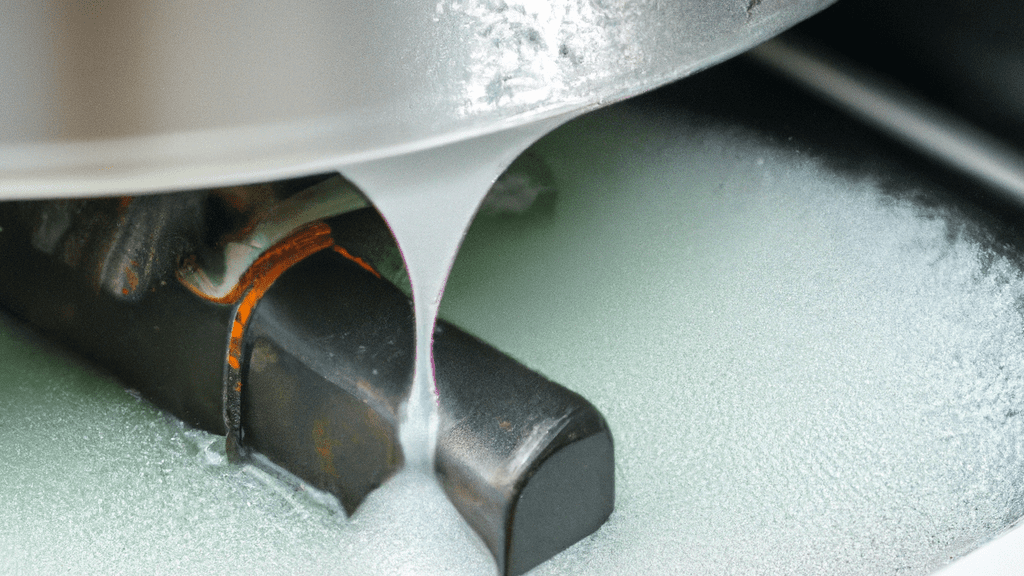If you notice an unusual amount of water leaking from your furnace and are unsure what to do immediately, call our HVAC team at 780-489-8118.
My...

If you notice an unusual amount of water leaking from your furnace and are unsure what to do immediately, call our HVAC team at 780-489-8118.
My furnace is leaking water, what do I do? Reasons why your furnace is leaking:
When your furnace leaks water in the winter season, it usually means one of the internal components is damaged or clogged—or a heating appliance attached to the furnace (standard conventional furnace) condensate pump could be the cause of the drain pump being clogged, causing excess water buildup.
Leaking water is a common problem for furnaces. Water accumulating in and around your furnace can pose a serious threat to your house and the life of your unit if left unaddressed by a qualified technician. If you notice water around your leaking furnace, call an HVAC professional for furnace repair immediately!
As an immediate step, you should turn off your thermostat first after which you will turn off the furnace switch on your unit. Your main priority is turning your furnace off. Use cleaning cloths to clean up the water on the floor and dry off your unit to prevent further water damage. At this point, you want to call an HVAC technician who is in the vicinity of your house to ensure you receive a speedy remedy before the water leak turns into a bigger problem; the last thing you want is an expensive furnace replacement.
While you will eventually have your furnace water leak addressed by a professional, here are some of the most common reasons why your furnace experiences a leak during winter.
Is My Furnace Leaking Water Really Dangerous?
Furnace water leaks may become lethal as they can lead to electrocution and short-circuit due to rising water levels within the unit. Unless it’s immediately looked into, you can risk paying for a costly repair due to a unit breakdown. Not only is the unit in danger, but also your basement floor may develop cracks over time due to improper floor drainage.
Since furnace breakdowns in winter can endanger your family’s safety during extremely cold temperatures, you need to schedule your furnace inspection as soon as possible.
When investigating water leaks, you want to establish where the leak is coming from as well as what type of furnace unit you have installed in your home.
Older homes will more likely have conventional furnaces that carry a low-efficiency rating. These furnaces have a metal exhaust pipe attached to one heat exchanger from where hot air is forced through ventilation into your home.
On the other hand, newer homes that are less than 5-6 years old are likelier to have high-efficiency furnaces set up that carry two heat exchangers with plastic PVC exhaust pipes. Once the initial gas output exits the first heat exchanger, it enters the secondary heat exchanger where the flu gas undergoes further heat transfer building up water vapor forms that turn into liquids when they exit to a condensate pump or a floor drain as it were.
Hence, the causes of the leak will differ based on the type of furnace unit you have. Typically, your conventional standard efficiency gas furnace will not gather liquid by itself which means the water comes from another appliance attached to the drain hose, such as a water heater or an air conditioner (in summer).
Leaks from Condensate Line
When the water from your high-efficiency furnace exits the unit, it pours into a condensate drain line. If there’s a crack in the condensate line or it’s clogged up with dust and other particles, the water won’t drain out properly and will gather around the furnace as a result.

Condensate Drain Hose Leaks
The drain hose is attached to the PVC exhaust pipe through additional tubing. If such tubing is damaged or disconnected with the added prospect of your drain hose is clogged with dirt or debris, then there will be a condensation leak.
If you think your furnace needs a tune-up, claim our $149 special by redeeming today. *Subject to change
Furnace Leak from Overflow Exhaust Pipe
If your standard efficiency furnace has an exhaust pipe that isn’t properly sized or connected, it can retain excess gas pressure causing condensation to leak from your furnace.
Furnace Humidifier Is Faulty
If your whole-house humidifier has a water line that’s leaking due to lack of maintenance or cleaning, it can cause your furnace to leak as it’s attached to the same condensate drain pump through which water from additional condensation exits.
Dirty Furnace Filter
If you haven’t been able to replace your furnace filter or been cleaning it periodically, the water has no way to exit the furnace causing leaks as a result.
Faulty Condensate Pump
The average lifespan of a condensate pump is 3-6 years. When water leaves the condensate drain hose, it exits into a condensate pump. If this is clogged or the condensate trap isn’t draining as expected, it will push water back to the unit causing a leak.
Why Is My Furnace Leaking Water When Heat Is On?
Regardless of the type of furnace you have, if an internal component of your unit has been compromised due to normal wear and tear or lack of maintenance, it will cause water leaks for a variety of reasons. With standard efficiency furnaces, the leak may come from clogged drainage from an attached appliance whereas with high-efficiency furnaces it may most likely originate from a faulty condensate drain or a cracked inducer assembly due to which leaks occur.
With furnace heat on almost round the clock during the day, you may see water leaks for reasons mentioned before. Hence, periodic upkeep and inspection of your furnace are critical to keeping it running smoothly and efficiently.
Why Is My Furnace Leaking Water When the A/C Is Off?
The first place to check is the evaporator coil around your furnace if you have central air conditioning hooked to your furnace.
During summers, if your A/C’s drain pan is cracked it may not collect water causing it to leak from your furnace. Additionally, a frozen evaporator coil and clogged drain line may lead to leaks as well.
Keeping Your Furnace Well Maintained
An HVAC system runs as efficiently as it’s made to. Even with newer higher-efficiency units, a lack of maintenance can cause it to function at reduced capacity with the system wearing out long before it’s due to run its course.
A certified HVAC technician will not only inspect your unit with proper fixes, but they will also provide you with affordable options to help keep your house HVAC system in tune for long-term performance.
Keep your furnace in top-notch condition with an annual maintenance program. Schedule a consultation with an HVAC expert.




